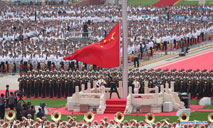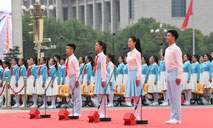Chinese envoy asks Japan to revoke decision to discharge nuclear-contaminated water into sea
UNITED NATIONS, June 25 (Xinhua) -- A Chinese envoy on Friday asked Japan to revoke its decision to discharge nuclear-contaminated water from the Fukushima Daiichi Nuclear Power Plant into the sea.
The disposal of nuclear-contaminated water from the Fukushima nuclear accident is not merely a domestic issue of Japan. The planned discharge will severely harm international public health, safety and the immediate interests of neighboring countries and their people, said Geng Shuang, China's deputy permanent representative to the United Nations.
"We strongly urge Japan to revoke its wrong decision. It must not wantonly start the ocean discharge before consulting and reaching consensus with all stakeholders, including neighboring countries and relevant international institutions," he told a meeting of states parties to the UN Convention on the Law of the Sea.
In response to a Japanese representative's statement at the meeting, Geng said the Japanese representative made erroneous remarks in an attempt to emphasize that the treated water will be harmless, that Japan has been open and transparent, and that the discharge plan has been approved by the International Atomic Energy Agency (IAEA).
The Fukushima nuclear accident is one of the most serious in the world history. The contaminated water is composed of cooling water injected into the melted reactor core, as well as groundwater and rainwater. It contains large amounts of radioactive isotopes which are created in the fission process and are non-existent in nature. There is no precedent to refer to, and the impact on marine environment, food security and public health cannot be neglected, he said.
"If the Fukushima nuclear-contaminated water will be harmless as Japan has claimed, why would Japan not keep it for domestic use? Why does Japan insist on dumping it into the sea?" he asked.
Japan has not been transparent and open as it self-proclaimed. Before the announcement of its decision to release nuclear-contaminated water into the sea, Japan did not fully consult neighboring countries and other stakeholders. After the announcement, many Pacific-Rim countries, including China, as well as organizations such as the Pacific Islands Forum, expressed concerns over Japan's decision. But so far, Japan has not responded earnestly to and has not addressed such concerns, said Geng.
The IAEA has never endorsed or approved Japan's decision to release nuclear-contaminated water into the sea. At present, the IAEA is establishing a technical working group and has confirmed that specialists from China and the Republic of Korea will be invited to join the group. China will offer full support to the relevant work and push Japan to respond to the concerns of the stakeholders and the rest of the international community, he said.
Japan should act in good faith, with a highly responsible attitude toward international public interests, and prudently address relevant issues in an open, transparent and scientific manner, he said.
Photos
Related Stories
- China urges Japan to keep promises on Taiwan question
- Interview: CPC leads Chinese people to create "miracle" -- Japanese politician
- Interview: Always staying with the people is secret of CPC's great achievements -- former Japanese PM
- Chinese Mission expresses "firm opposition" to EU-Japan remarks on China
- China urges Japan to face up to int'l concerns over nuclear contaminated water dump
Copyright © 2021 People's Daily Online. All Rights Reserved.










